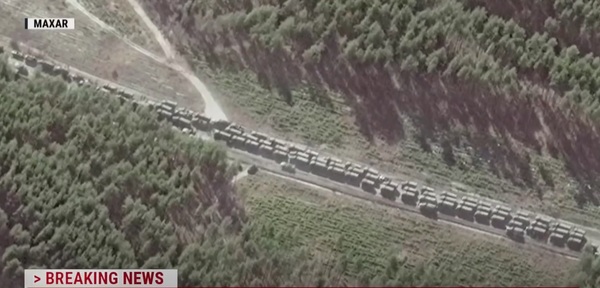
–>
May 3, 2023
Initially the goal of the Russian military was to strategically take over all of Ukraine by focusing on taking over the capital Kiev, installing a puppet government sympathetic to Russia, and occupying all of Ukraine as needed. Logistic challenges were too many. Poor troop training and planning were primary causes of failure.
‘); googletag.cmd.push(function () { googletag.display(‘div-gpt-ad-1609268089992-0’); }); }
More than one Russian soldier was lied to initially by their commanders who said that the soldiers were going on a training mission and not to fight in Ukraine. Overly confident Putin lied and first categorized the war as a “special military operation” and not a war. On December 23, 2022 about 10 months into the war Putin finally admitted for the first time that it was actually in a war with Ukraine.
Early in the attack towards the capital Kiev there was no access to railroad transport and roads were clogged with Russian vehicles. Fuel, munitions, spare parts, and other materiel were not efficiently distributed to forward combat lines. Supply lines could not keep up with the long combat pushes and logistics vehicles were not properly protected.
One example was a 40-mile-long Russian military convoy which stood still in front of a river with a blown-up bridge for about a month outside of Kiev. It was a sitting duck for guerrilla counterattacks.

YouTube screengrab (cropped)
‘); googletag.cmd.push(function () { googletag.display(‘div-gpt-ad-1609270365559-0’); }); }
Another example of acute Russian failure was a strategic airport near Kiev which was an ideal resupply area. Russian paratroopers held on to the airport briefly, but Ukraine easily got it back.
The Russian ground offensive was probably made on the incorrect assumptions on how the Ukrainian military, the Ukrainian people, and the West would react. The Russian surprise 2014 cakewalk into parts of Donetsk or Eastern Ukraine and the easy takeover of Crimea on the Black Sea probably lured Putin into thinking that invading the whole of Ukraine would be a similar easy cakewalk.
Little did the Russians realize that occupation of territory was not enough; controlling the territory once occupied was problematic with a hostile Ukrainian populace. Strategically, the Russians failed to coordinate their land, air, and rocket or missile attacks with too small an invasion force which permitted the west to supply military hardware via Western Ukraine with the railroads and electrical grids still functional.
Russian offensive cyber and electronic warfare failed to blind Ukrainian military command and control or threaten critical infrastructure for prolonged periods. Ukraine was able to blunt the effects of the cyberattacks with defensive help from private companies, Western governments, and other state and non-state actors.
I have been following the war almost on a daily basis since it started and it is sometimes hard to discern what is Russian and Ukrainian believable propaganda and what is not, but I am most shocked by some of the videos of Russian soldiers complaining about the military and how badly they are being treated by their commanders and by the corrupt military bureaucracy. Also, some of the intercepted cellphone calls by soldiers with their wives and acquaintances are hard to believe but probably true in many cases since they were peppered with abundant Russian profanities.
Many if not most of the soldiers are under contractual agreements, many are not being paid, contracts are not terminated as written, and many wives back in Russia are not paid compensation when husbands or offspring are killed or missing in action since their deaths are almost never recorded. Soldiers complain of inadequate military provisions such as no body armor, outdated World War II head helmets, no first aid kits, and most important of all, having to go many days without food and water.
‘); googletag.cmd.push(function () { googletag.display(‘div-gpt-ad-1609268078422-0’); }); } if (publir_show_ads) { document.write(“
Soldiers, especially the Russian ethnic minorities, complain with a lot of profanity to their wives and others that their commanders abuse them and treat them like cannon fodder. Many soldiers complain that the commanders are incompetent and generally don’t care about them or their needs, that if wounded or sick, the medical doctors pay minimal attention and send them back to the front lines, and if they don’t attack when commanded, they are imprisoned or even shot by the second line of defense when trying to retreat. Many killed soldiers are not carried back for burial but are left in the field to rot.
Alcoholism is a big problem, and what little money the soldiers may get, the frontline conditions are sometimes so unbearable that they spend the money mostly on alcohol, which is sometimes poisoned by local vendors and causes blindness or even death. There are numerous reports of about a hundred or so soldiers attacking and only a handful surviving the assault.
Since the Russian command communications are not encrypted and there is a top- down military command structure, Russia lost about a dozen generals and many commanders during the war since Ukrainian military intelligence was so good.
The Russian winter offensive of 2023 petered out and many generals were replaced for incompetence. In Eastern Ukraine known as the Donbas where most of the combat has taken place, an unexpected feud erupted between Putin confidant Yevgeny Prigozhin, founder of the Wagner Group and Minister of Defense Sergei Shoigu who is in charge of the Russian generals. Prigozhin’s relatively successful Wagner mercenaries, who had even recruited jailed criminals to fight, and the incompetent regular Russian forces under the leadership of Shoigu and his generals had a power struggle almost forbidden in the Russian military. Lack of artillery shells, munitions, and soldiers or lack of adequate military support was Prigozhin’s daring public complaint.
The war of attrition of troops and military hardware has become so dire that there is now talk circulating about the coming Ukrainian counteroffensive. There is talk about switching to a Russian defensive posture instead of an offensive posture by even Russian propagandists.
Without much military action by both sides, the situation in reality is a true trench warfare stalemate. If rumors of a Ukrainian counteroffensive don’t pan out or worse yet one fails, then a negotiated settlement may be in the works. Ukraine does not treat its troops like cannon fodder and the morale of the soldiers is much better than the very low morale of the Russian soldiers. However, Ukraine is also burdened with poorly trained soldiers not versed in strategic moves and any major strategic move will probably run into the same problems and mistakes that the Russians had when they initially attacked Ukraine strategically.
Inexperienced soldiers operating a potpourri of newly acquired western military hardware may yield a possible chaotic confused mess. A top-down Ukrainian military command structure inherited from the Russians can’t be easily changed overnight so battlefront command communications and coordination may be highly inefficient. Another self-defeating tactic would be to engage the Russians in trench warfare with huge offensive casualties, which Ukraine can’t afford. So, trying to bypass all the Russian trenches would seem like a smart thing to do.
Only time will tell whether the Ukrainian strategic counteroffensive, if it comes at all, will show the same degree of incompetence and poor planning that is evident by the Russian offensives for over the past14 months of war.
<!– if(page_width_onload <= 479) { document.write("
“); googletag.cmd.push(function() { googletag.display(‘div-gpt-ad-1345489840937-4’); }); } –> If you experience technical problems, please write to [email protected]
FOLLOW US ON
<!–
–>
<!– _qoptions={ qacct:”p-9bKF-NgTuSFM6″ }; ![]() –> <!—-> <!– var addthis_share = { email_template: “new_template” } –>
–> <!—-> <!– var addthis_share = { email_template: “new_template” } –>





